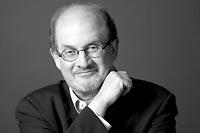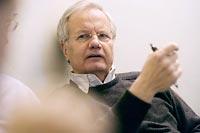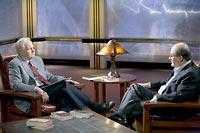Deep thoughts with Bill Moyers

Call it intellectual trickle-down: Great thinkers of our time talk to Bill Moyers, then he talks to us.
In the engrossing "Bill Moyers on Faith & Reason" (debuting 9 p.m. Friday on KCTS), he mind-melds with Salman Rushdie, Margaret Atwood, Martin Amis and other writers on the rise of radical Islam and fundamentalist Christianity, their similarities, their influence on politics — and the need for transcendence even among skeptics.
The Emmy-winning broadcaster, 72, settled in for a spirited dialogue from the porch of his New Jersey home.
Q: Why talk to writers about faith and reason?
A: Because storytellers have a great ability to imagine what it's like on the other side. They can take us across boundaries that we cannot literally go, and their love of language enables them to reach the nuances in this tension between faith and reason that few of us can. Theologians come at it with a fixed opinion. Ideologues come at it with a closed mind. But writers are always letting the story carry them where their imagination leads.
Q: America seems fiercely anti-intellectual right now — i.e., more faith, less reason.
A: If you judge only by what we see in the media and read on the blogs, yes. There's no question that there's a great divide between the religious and the secular. But I'll tell you, most people I know — my family, my friends, my neighbors, my colleagues at work — don't live on either side of that divide. Most of us are walking a swinging bridge between them. To change the metaphor, most of us ride both ends of the seesaw of faith and doubt.
Fundamentalists have framed the debate. They come charging in with their absolute truths like picadors, and they draw blood. But the fact of the matter is that we've allowed opposite ends of the spectrum to dominate the discourse. The Madalyn O'Hairs on one end and the Pat Robertsons and Jerry Falwells and James Dobsons on the other end.
Mary Gordon, accomplished novelist, essayist, memoirist, faithful Catholic ... tells me in the second broadcast, "Faith without doubt is just either nostalgia or a kind of addiction," and I think that's true.
Q: Gordon tells you, "The Gospel is about seeing every human being as Jesus." But does it seem to you that many people who call themselves religious now are focused on exclusion?
A: Yes. You rarely hear them invoke the love of Jesus or the love of God or the sympathy extended to the prostitute, the tax collector, the prisoner. And as (religious scholar Randall) Balmer says, I believe that they have hijacked Jesus, they've hijacked God, they've hijacked Scripture and they've hijacked democracy.
Q: It seems that in the media, the goal of objectivity has gone to the absurd extreme of giving fact and belief equal weight. Knowledge and ignorance are treated as two equal sides of an argument — often just to keep from offending anyone.
A: I'm so dismayed by the simple definition of objectivity interpreted to mean you put on one spinner, he's matched by another spinner, and the public is left to decide the difference between the two opinions — as if that takes them to the truth of experience. It doesn't. This is one reason for the enfeebled journalism practiced in Washington these days and the reason so many of our colleagues in the Beltway went along with the unquestioned assertions in the buildup to the war.
Q: Rushdie tells you, "The time-honored role of the artist is to speak truth to power." And boy, he ought to know.
A: Yes, I mean here's a man who spent 10 years of his life under a sentence of death for the sin of writing a book. The reason I began the series with him is, like the soldier back from the front lines, this man knows what war in the trenches is really like, what it's like to be confronted by angry, militant true believers. And here we come to another revelation of the hypocrisy of the right: When Pat Robertson speaks up with a fatwa against the president of Venezuela, the right turns and looks the other way.
Q: That doesn't seem like something Jesus would do.
A: I don't think Jesus confirms the politics of the left or the right. I understand but am somewhat chagrined by some people on the left, some progressives, who are trying to encourage Democrats to imitate the God talk of the right. What we need are articulate and eloquent defenders of the Enlightenment, and eloquent and courageous champions of secular democracy. Because in the public square, secular democracy should be our god. And this is again where the right has grotesquely seized language for their own purposes.
The constant refrain that we are a Christian nation, that our founders were Christian men, that church and state belong together, is at odds with the true story of our founding era. The founders of this country were men steeped in the history of Europe, riveted with bloody religious wars. They did not want that to happen here.
Q: Richard Rodriguez talks about the effect of his brush with death on his spirituality. How did your heart bypass in 1994 affect yours?
A: I was in intensive care for three days and knew nothing. ... I woke up at midnight in my room alone, and someone who had left earlier had left public television on ... and it was a midnight repeat of a Beethoven's Fifth Symphony, and I awakened to the sound of that glorious music filling the room with an electric and magical presence that was the best usher I could have back into the real world.
And I realized later as I thought about it that it wasn't a bit of Scripture and it wasn't a blessing from a chaplain that had greeted my return or informed my return. It was the experience of that music that took me somewhere that language couldn't.
Q: You're sure lucky you didn't wake up to an infomercial.
A: (Laughs.)
Q: Of all the people you've interviewed over the years, do you have a favorite?
A: No, I actually don't. It's a little bit like asking which of my three children I favor, and I prefer each of them for different reasons. I think I will be remembered — for as long as I'm remembered, which is about 24 hours after I'm gone — I'll be remembered for the Joseph Campbell series ("The Power of Myth"), which was clearly an accident. When I told public broadcasting that I was going to do a series with this fellow who was obscure to most people, there was a great deal of grumbling and resistance. I mean, two white guys in ties sitting around talking about mythology? A lot of stations didn't want it, but the moment it went on, it touched the zeitgeist.
Q: I think people would be tickled to find that you laughed your ass off to something like Benny Hill.
A: Oh, well, we love "Frasier." My wife and I will sometimes look at four in a row when we're having a drink. We like light fare a lot. I don't dwell constantly in the world of ideas, although that's been one of my beats for a long time.
Mark Rahner: 206-464-8259 or mrahner@seattletimes.com



